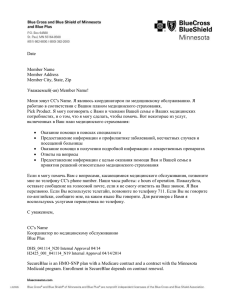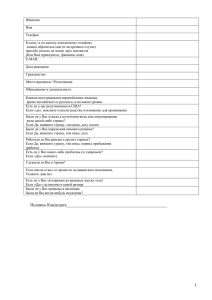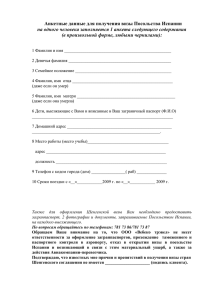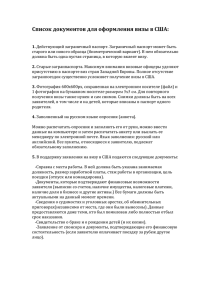Постановление Европейского Парламента и Совета (ЕС) № 265/2010 от
реклама
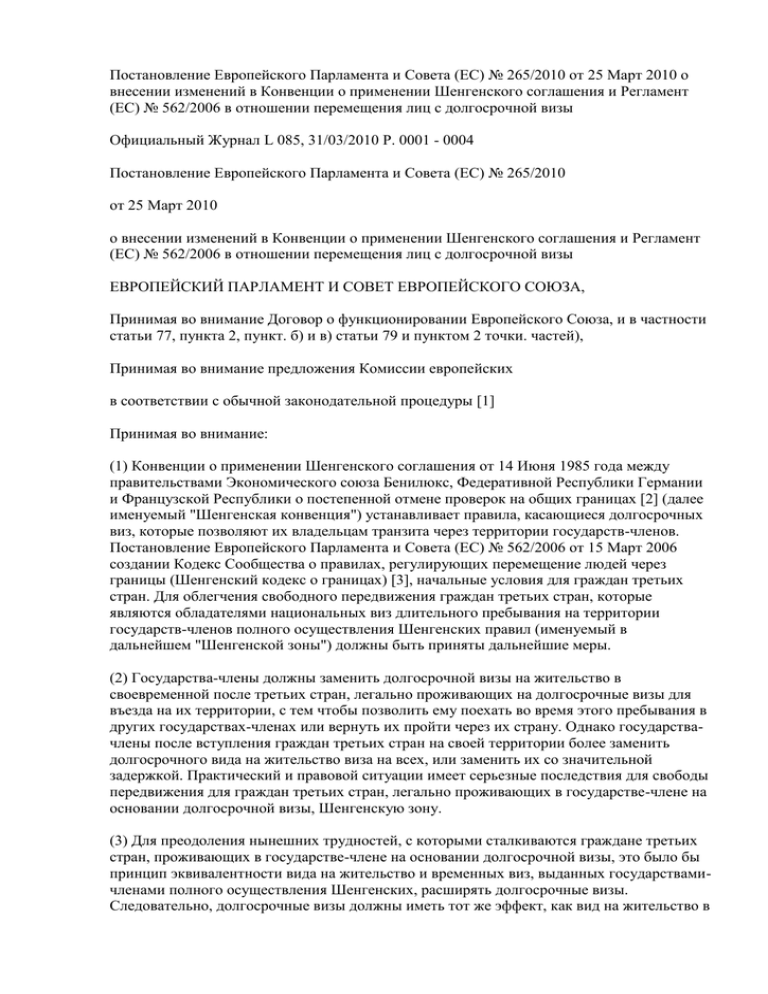
Постановление Европейского Парламента и Совета (ЕС) № 265/2010 от 25 Март 2010 о внесении изменений в Конвенции о применении Шенгенского соглашения и Регламент (EC) № 562/2006 в отношении перемещения лиц с долгосрочной визы Официальный Журнал L 085, 31/03/2010 P. 0001 - 0004 Постановление Европейского Парламента и Совета (ЕС) № 265/2010 от 25 Март 2010 о внесении изменений в Конвенции о применении Шенгенского соглашения и Регламент (EC) № 562/2006 в отношении перемещения лиц с долгосрочной визы ЕВРОПЕЙСКИЙ ПАРЛАМЕНТ И СОВЕТ ЕВРОПЕЙСКОГО СОЮЗА, Принимая во внимание Договор о функционировании Европейского Союза, и в частности статьи 77, пункта 2, пункт. б) и в) статьи 79 и пунктом 2 точки. частей), Принимая во внимание предложения Комиссии европейских в соответствии с обычной законодательной процедуры [1] Принимая во внимание: (1) Конвенции о применении Шенгенского соглашения от 14 Июня 1985 года между правительствами Экономического союза Бенилюкс, Федеративной Республики Германии и Французской Республики о постепенной отмене проверок на общих границах [2] (далее именуемый "Шенгенская конвенция") устанавливает правила, касающиеся долгосрочных виз, которые позволяют их владельцам транзита через территории государств-членов. Постановление Европейского Парламента и Совета (ЕС) № 562/2006 от 15 Март 2006 создании Кодекс Сообщества о правилах, регулирующих перемещение людей через границы (Шенгенский кодекс о границах) [3], начальные условия для граждан третьих стран. Для облегчения свободного передвижения граждан третьих стран, которые являются обладателями национальных виз длительного пребывания на территории государств-членов полного осуществления Шенгенских правил (именуемый в дальнейшем "Шенгенской зоны") должны быть приняты дальнейшие меры. (2) Государства-члены должны заменить долгосрочной визы на жительство в своевременной после третьих стран, легально проживающих на долгосрочные визы для въезда на их территории, с тем чтобы позволить ему поехать во время этого пребывания в других государствах-членах или вернуть их пройти через их страну. Однако государствачлены после вступления граждан третьих стран на своей территории более заменить долгосрочного вида на жительство виза на всех, или заменить их со значительной задержкой. Практический и правовой ситуации имеет серьезные последствия для свободы передвижения для граждан третьих стран, легально проживающих в государстве-члене на основании долгосрочной визы, Шенгенскую зону. (3) Для преодоления нынешних трудностей, с которыми сталкиваются граждане третьих стран, проживающих в государстве-члене на основании долгосрочной визы, это было бы принцип эквивалентности вида на жительство и временных виз, выданных государствамичленами полного осуществления Шенгенских, расширять долгосрочные визы. Следовательно, долгосрочные визы должны иметь тот же эффект, как вид на жительство в условиях свободного передвижения владельца визы в Шенгенскую зону. (4) третьей страны, который работает на долгосрочную визу выданных государства-члены должны иметь возможность для поездок в другие государства-члены до трех месяцев в любом шестимесячный срок на тех же условиях в качестве владельца вида на жительство. Настоящие Правила не наносит ущерба правила, касающиеся условий выдачи долгосрочных виз. (5) В соответствии с существующей практикой, государства-члены, устанавливает обязательства для государства-члены предоставить долгосрочные визы в единую форму визы, как это определено в Регламент Совета (ЕС) № 1683/95 [4]. (6) правила доступа к Шенгенской информационной системе и для проведения консультаций с другими государствами-членами в журнале событий во время исполнения заявки на жительство следует подать заявление на визу для долгосрочных виз. Свободное передвижение долгосрочной визы владельцам в другие государства-члены не будут для государств-членов без каких-либо дополнительных рисков безопасности. (7) Шенгенской Конвенции и Регламента (ЕС) № 562/2006 должны быть внесены соответствующие изменения. (8) Настоящие Правила не препятствуют государствам-членам от выдачи разрешений на пребывание и это не должно влиять на обязательства государств-членов по вопросу вида на жительство для отдельных категорий граждан третьих стран, установленных другими актами Союза, в частности Директивы 2005/71/EC [5] Директива 2004/114/EC [6] Директива 2004/38/EC [7] Директива 2003/109/EC [8] и Директива 2003/86/EC [9]. (9) В соответствии с европейскими Парламента и Совета 2008/115/EC от 16 Декабря 2008 года на общих стандартов и процедур в государствах-членах для возвращения незаконно пребывающих граждан третьих стран [10] должны быть граждане третьих стран, незаконно пребывающих на территории государств-членов и имеющим действительный вид на жительство или иного разрешения по размещению вид на жительство, выданного другим государством-членом, например, долгосрочная виза требуется немедленно удалить территории другого государства-члена. (10) С целью настоящих Правил, а именно установить правила на свободное передвижение лиц с долгосрочной визы, не может быть достаточно достигнуты государствами-членами и поэтому, в силу своего масштаба и последствий лучше достигнуты на уровне Союза, союз может принять меры в соответствии Принцип субсидиарности, предусмотренным в статье 5 Договора о Европейском Союзе. В соответствии с принципом пропорциональности, как это изложено в этой статье, настоящих Правил, не выходит за пределы того, что необходимо для достижения этой цели. (11) Настоящие Правила признает основные права и соблюдает принципы, признанные в Хартии основных прав Европейского Союза. Он должен применяться в соответствии с обязательствами государств-членов в области международной защиты и невыдворения. (12) Что касается Исландии и Норвегии, настоящих Правил, положений Шенгенского по смыслу Соглашения между Европейским Союзом и Республикой Исландия и Норвегия, касающиеся ассоциации latters "с реализации, применения и развития Шенгенского [11], которые района, указанного в статье 1, пункт Б из Решение Совета 1999/437/EC от 17 Мая 1999 года определенные меры по применению этого соглашения [12]. (13) Что касается Швейцарии, настоящих Правил, положений Шенгенского по смыслу Соглашения между Европейским Союзом, Европейским сообществом и Швейцарской Конфедерации по Швейцарской Конфедерации с реализации, применения и развития Шенгенского [13], которые входят в область, упомянутых в статье . 1, точки В и С Решение 1999/437/EC в сочетании со статьей 3 Решение Совета 2008/146/EC [14]. (14) Что касается Лихтенштейна, настоящих Правил, положений Шенгенского по смыслу Протокола, подписанного между Европейским Союзом, Европейским сообществом, Швейцарской Конфедерации и Княжества Лихтенштейн к Соглашению между Европейским Союзом, Европейским сообществом и Швейцарской Конфедерации по Швейцарской Конфедерации реализации, применения и развития Шенгенского законодательства, которые входят в области, упомянутые в статье 1, точки В и С Решение 1999/437/EC в сочетании со статьей 3 Решение Совета 2008/261/EC [15]. (15) В соответствии со статьями 1 и 2 Протокола № 22 о позиции Дании, прилагаемый к Договору о Европейском Союзе и Договор о Европейском Союзе, Дания не участвует в принятии настоящих Правил и Правил, а не обязательными. Учитывая, что настоящих Правил опирается на Шенгенские, Дания, в соответствии со статьей 4 настоящего Соглашения в течение шести месяцев с даты его принятия Советом, как в свое национальное законодательство. (16) Настоящие Правила являются развитие Шенгенских, которые не связаны с Соединенным Королевством в соответствии с Решением Совета 2000/365/EC от 29 Мая 2000 года Соединенное Королевство Великобритании и Северной Ирландии, чтобы принять участие в некоторых из положений Шенгенского [16] Поэтому Соединенное Королевство не принимает участия в его принятия и не связан или предмету. (17) Настоящие Правила являются развитие Шенгенского в котором Россия не участвует в соответствии с Решением Совета 2002/192/EC от 28 Февраля 2002 года о запросе в Ирландии, чтобы принять участие в некоторых из положений Шенгенского [17] Ирландия, следовательно, не принимает участие в его принятия и не связан или предмету. (18) Что касается Кипра, настоящих Правил, составляет акт опираясь на Шенгенских или иным образом связанных с смыслу статьи 3, пункт 2 Закона о присоединении 2003 года. (19) Настоящие Правила представляет собой акт опираясь на Шенгенских или иным образом связанных с смыслу статьи 4, пункт 2 Закона о присоединении 2005 Принято НАСТОЯЩИХ ПРАВИЛ: Статья 1 Шенгенской конвенции вносятся следующие изменения: 1) статьи 18 изложить в следующей редакции: "Статья 18 Первый Визы для пребывания более чем на три месяца (именуемое в дальнейшем "долгосрочные визы) являются национальные визы, выданные одним государством- членом согласно его национальному законодательству или законам ЕС. Должен быть предоставлен в единую форму визы в соответствии с Постановлением Совета (ЕС) № 1683/95] [, с указанием типа визы, буква "D". Чтобы быть завершена в соответствии с соответствующими положениями приложения VII Европейского парламента и Совета (ЕС) № 810/2009 от 13 Июль 2009 создании Кодекс Сообщества о визах (Визовый кодекс) []. Вторая Продолжительность долгосрочной визы не может превышать одного года. Если государства-члена позволяет иностранцам оставаться более одного года должно быть долгосрочной визы до истечения срока его действия заменен на жительство. 2) статью 21 изложить в следующей редакции: а) Пункт 1 заменяется следующим: "1 Иностранцы, имеющие действительный вид на жительство выдается на государствочлен может, на основании этого разрешения и действительный паспорт для свободного передвижения по истечении трех месяцев в течение любого шестимесячного периода в другие государства-члены, если они отвечают вступления условиями, изложенными в Статья 5, пункт 1 балл.), с) е) Европейского парламента и Совета (ЕС) № 562/2006 от 15 марта 2006 года, создание Кодекс Сообщества о правилах, регулирующих перемещение людей через границы (Шенгенский кодекс о границах ) [], а не на национальный перечень лиц, подлежащих отказано во въезде на территорию государства-члена. б) добавляется следующий абзац: "2. Право на свободное передвижение в соответствии с пунктом 1 настоящей статьи применяются к иностранцам, имеющим действительный долгосрочной визы выданной государством-членом в соответствии со статьей 18" 3) статьи 25 в следующей редакции: а) Пункт 1 заменяется следующим: "1 Если государство-член намерено выпустить на жительство, компетентный орган систематический поиск в Шенгенской информационной системе. Если государство-член намерено выпустить вида на жительство для иностранца, который имеет записи с целью отказа во въезде, он проводит консультации заранее с государством-членом, который выдал предупреждение, а с учетом своих интересов, в таких случаях, вид на жительство выдается только по веским причинам, в частности, по гуманитарным соображениям или по причине международных обязательств. Если вид на жительство выдается, государство-член выдачи предупреждений, он отменил, но может иностранец в своем национальном списке лиц, подлежащих отказано во въезде ". б) добавляется следующий абзац: "1. Перед вставкой записи в порядке вступления в соответствии со статьей 96 государствам-членам для проверки записей, выданный национальным долгосрочной визы или вида на жительство". с) добавляется следующий абзац: "3 Пункты 1 и 2 применяются также к долгосрочной визы." Статья 2 Статья 5 Регламента (ЕС) № 562/2006 вносятся следующие изменения: 1) В пункте 1, пункт б) гласит следующее: "B) имеют действующую визу, если требуется в соответствии с Постановлением Совета (ЕС) № 539/2001 от 15 марта 2001 список третьих стран, граждане которых должны иметь визу при пересечении внешних границ и тех, чьи третьих стран, граждане которых освобождены от этого требования [], если они не имеют действительный вид на жительство или действительно долгосрочные визы 2) В пункте 4 точки) заменяется на следующее: ") Граждан третьих стран, которые не отвечают всем условиям, изложенным в пункте 1, но держать на жительство, визы или долгосрочной возвращения визы, выданной государств-членов или, при необходимости, вид на жительство, визы или долгосрочной Re-въездной визы имеет право въезжать на территорию других государств-членов в целях транзита, с тем чтобы достичь территории государства-члена позволяет государству, долгосрочную визу или возвращения визы, если перечисленные на национальный перечень лиц, подлежащих отказано во въезде на территорию членов государство, внешние границы они намерены крест и предупреждение сопровождается инструкциями об отказе во въезде или транзите. " Статья 3 Настоящие Правила не наносит ущерба государствам-членам в выдаче вида на жительство для граждан третьих стран, как это предусмотрено другими законодательными актами ЕС. Статья 4 Комиссия и государства-члены в полной мере и адекватно информировать граждан третьих стран на настоящих Правил. Статья 5 Комиссия на 5 Апрель 2012 Европейского парламента и Совета по реализации настоящего постановления. При необходимости, в приложении к докладу предложение о его поправки. Статья 6 Настоящие Правила вступают в силу 5 Апреля 2010 года. Настоящие Правила являются обязательными во всей его полноте и непосредственно применяются во всех государствах-членах в соответствии с договорами. Брюссель, 25 Марта 2010 года. Европейский парламент Президент Е. Бузеком Для Совета Президент Д. Лопес Гарридо [1] Европейский парламент от 9 Март 2010 (еще не опубликовано в Официальном журнале) и решение Совета от 22 Марта 2010 года. [2] OJ. Л. 239 L, 22.9.2000, стр. 19 [3] OJ. Л. 105 л, 13.4.2006, стр. 1 [4] OJ. Л. 164 L, 14.7.1995, стр. 1 [5] Директива Совета 2005/71/EC от 12 Октября 2005 года о конкретных порядок допуска граждан третьих стран для целей научных исследований (OJ. L 289, 3.11.2005, стр. 15). [6] Директива Совета 2004/114/EC от 13 Декабря 2004 года об условиях допуска граждан третьих стран для целей исследования, ученик обмена, подготовки или неоплачиваемой добровольной службы (OJ. L 375, 23.12.2004, стр. 12). [7] Европейский парламент и Совет Директивы 2004/38/ЕС от 29 Апреля 2004 года о праве граждан ЕС и членов их семей свободно передвигаться и проживать на территории государств-членов (OJ. L 158, 30.4.2004, стр. 77). [8] Директива Совета 2003/109/EC от 25 Ноябрь 2003, касающиеся правового статуса граждан третьих стран, которые являются долгосрочными резидентами (OJ. L 16, 23.1.2004, стр. 44). [9] Директива Совета 2003/86/EC от 22 Сентября 2003 года о праве на воссоединение семьи (OJ. L 251, 3.10.2003, стр. 12). [10] OJ. Л. L 348, 24 декабря, 2008, стр. 98 [11] OJ. Л. OJ L 176, 10.7.1999, стр. 36 [12] OJ. Л. OJ L 176, 10.7.1999, стр. 31 [13] OJ. Л. 53 л, 27.2.2008, стр. 52 [14] OJ. Л. 53 л, 27.2.2008, стр. 1 [15] OJ. Л. 83 л, 26.3.2008, стр. 3 [16] OJ. Л. 131 L, 1.6.2000. стр. 43 [17] OJ. Л. 64 L, 7.3.2002, стр. 20 [] OJ. Л. 164 L, 14.7.1995, стр. 1 [] OJ. Л. L 243, 15 сентября 2009 года, стр. 1 " [] OJ. Л. L 105, 13.4.2006, стр. 1; [] OJ. Л. 81 L, 21.3.2001, стр. 1 " -------------------------------------------------Использовать Переводчик Google в следующих ситуациях:ПоискВидеоЭлектронная почтаТелефонЧатБизнес О Переводчике GoogleОтключить моментальный переводКонфиденциальностьСправк Regulation (EU) No 265/2010 of the European Parliament and of the Council of 25 March 2010 amending the Convention Implementing the Schengen Agreement and Regulation (EC) No 562/2006 as regards movement of persons with a long-stay visa Official Journal L 085 , 31/03/2010 P. 0001 - 0004 Regulation (EU) No 265/2010 of the European Parliament and of the Council of 25 March 2010 amending the Convention Implementing the Schengen Agreement and Regulation (EC) No 562/2006 as regards movement of persons with a long-stay visa THE EUROPEAN PARLIAMENT AND THE COUNCIL OF THE EUROPEAN UNION, Having regard to the Treaty on the Functioning of the European Union, and in particular Article 77(2)(b) and (c) and Article 79(2)(a) thereof, Having regard to the proposals from the European Commission, Acting in accordance with the ordinary legislative procedure [1], Whereas: (1) The Convention Implementing the Schengen Agreement of 14 June 1985 between the Governments of the States of the Benelux Economic Union, the Federal Republic of Germany and the French Republic on the gradual abolition of checks at their common borders [2] (the Schengen Convention) lays down rules on long-stay visas that enable their holders to transit through the territories of the Member States. Regulation (EC) No 562/2006 of the European Parliament and of the Council of 15 March 2006 establishing a Community Code on the rules governing the movement of persons across borders (Schengen Borders Code) [3] lays down entry conditions for third-country nationals. In order to facilitate the free movement of third- country nationals who hold national long-stay visas within the territory of Member States fully implementing the Schengen acquis (the Schengen Area), further measures should be taken. (2) Member States should replace long-stay visas by residence permits in due time following the entry into their territory of third-country nationals legally residing on the basis of a long-stay visa in order to enable them to travel to other Member States during their stay or to transit through the territories of other Member States when returning to their home country. However, following the entry of third-country nationals into their territory, Member States increasingly do not replace long-stay visas by residence permits or do so only after considerable delay. This legal and practical situation has significant negative consequences on the freedom of movement within the Schengen Area of third-country nationals legally residing in a Member State on the basis of a long-stay visa. (3) In order to overcome the problems encountered by third-country nationals residing in a Member State on the basis of a long-stay visa, this Regulation should extend the principle of equivalence between residence permits and short-stay visas issued by the Member States fully implementing the Schengen acquis to long-stay visas. As a result, a long-stay visa should have the same effects as a residence permit as regards the freedom of movement of the holder in the Schengen Area. (4) A third-country national holding a long-stay visa issued by a Member State should therefore be allowed to travel to other Member States for three months in any six-month period, under the same conditions as the holder of a residence permit. This Regulation does not affect the rules regarding the conditions for issuing long-stay visas. (5) In line with the current practice of the Member States, this Regulation establishes the obligation for Member States to issue long-stay visas in the uniform format for visas as set out in Council Regulation (EC) No 1683/95 [4]. (6) The rules on consulting the Schengen Information System and the other Member States in the event of an alert when processing an application for a residence permit should also apply to the processing of long-stay visa applications. The freedom of movement of a holder of a long-stay visa in the other Member States therefore should not constitute any additional security risk for the Member States. (7) The Schengen Convention and Regulation (EC) No 562/2006 should be amended accordingly. (8) This Regulation does not aim at discouraging Member States from issuing residence permits and it should not affect the obligation of Member States to issue residence permits for certain categories of third-country nationals as provided for by other Union instruments, in particular: Directive 2005/71/EC [5], Directive 2004/114/EC [6], Directive 2004/38/EC [7], Directive 2003/109/EC [8] and Directive 2003/86/EC [9]. (9) In accordance with Directive 2008/115/EC of the European Parliament and of the Council of 16 December 2008 on common standards and procedures in Member States for returning illegally staying third-country nationals [10], third-country nationals staying illegally on the territory of a Member State and holding a valid residence permit, or other authorisation offering a right to stay issued by another Member State such as a long-stay visa, should be required to go to the territory of that other Member State immediately. (10) Since the objective of this Regulation, namely the establishment of the rules on the freedom of movement with a long-stay visa, cannot be sufficiently achieved by the Member States and can therefore, by reason of its scale and effects be better achieved at Union level, the Union may adopt measures, in accordance with principle of subsidiarity as set out in Article 5 of the Treaty on the European Union. In accordance with the principle of proportionality, as set out in that Article, this Regulation does not go beyond what is necessary in order to achieve that objective. (11) This Regulation respects the fundamental rights and observes the principles recognised in particular by the Charter of Fundamental Rights of the European Union. It should be applied in accordance with the Member States' obligations as regards international protection and nonrefoulement. (12) As regards Iceland and Norway, this Regulation constitutes a development of the provisions of the Schengen acquis within the meaning of the Agreement concluded by the Council of the European Union and the Republic of Iceland and the Kingdom of Norway concerning the latters' association with the implementation, application and development of the Schengen acquis [11], which fall within the area referred to in Article 1, point (B), of Council Decision 1999/437/EC of 17 May 1999 on certain arrangements for the application of that Agreement [12]. (13) As regards Switzerland, this Regulation constitutes a development of the provisions of the Schengen acquis within the meaning of the Agreement between the European Union, the European Community and the Swiss Confederation on the Swiss Confederation's association with the implementation, application and development of the Schengen acquis [13], which fall within the area referred to in Article 1, points (B) and (C), of Decision 1999/437/EC read in conjunction with Article 3 of Council Decision 2008/146/EC [14]. (14) As regards Liechtenstein, this Regulation constitutes a development of the provisions of the Schengen acquis within the meaning of the Protocol signed between the European Union, the European Community, the Swiss Confederation and the Principality of Liechtenstein on the accession of the Principality of Liechtenstein to the Agreement between the European Union, the European Community and the Swiss Confederation on the Swiss Confederation's association with the implementation, application and development of the Schengen acquis, which fall in the area referred to in Article 1, points (B) and (C) of Decision 1999/437/EC read in conjunction with Article 3 of Council Decision 2008/261/EC [15]. (15) In accordance with Articles 1 and 2 of Protocol No 22 on the position of Denmark, annexed to the Treaty on European Union and to the Treaty on the Functioning of the European Union, Denmark is not taking part in the adoption of this Regulation and is not bound by it or subject to its application. Given that this Regulation builds upon the Schengen acquis, Denmark shall, in accordance with Article 4 of that Protocol, decide within a period of six months after the Council has decided on this Regulation whether it will implement it in its national law. (16) This Regulation constitutes a development of the provisions of the Schengen acquis in which the United Kingdom does not take part, in accordance with Council Decision 2000/365/EC of 29 May 2000 concerning the request of the United Kingdom of Great Britain and Northern Ireland to take part in some of the provisions of the Schengen acquis [16]; the United Kingdom is therefore not taking part in its adoption and is not bound by it or subject to its application. (17) This Regulation constitutes a development of the provisions of the Schengen acquis in which Ireland does not take part, in accordance with Council Decision 2002/192/EC of 28 February 2002, concerning Ireland's request to take part in some of the provisions of the Schengen acquis [17]; Ireland is therefore not taking part in its adoption and is not bound by it or subject to its application. (18) As regards Cyprus, this Regulation constitutes an act building upon the Schengen acquis or otherwise related to it within the meaning of Article 3(2) of the 2003 Act of Accession. (19) This Regulation constitutes an act building upon the Schengen acquis or otherwise related to it within the meaning of Article 4(2) of the 2005 Act of Accession, HAVE ADOPTED THIS REGULATION: Article 1 The Schengen Convention is amended as follows: (1) Article 18 is replaced by the following: "Article 18 1. Visas for stays exceeding three months (long-stay visas) shall be national visas issued by one of the Member States in accordance with its national law or Union law. Such visas shall be issued in the uniform format for visas as set out in Council Regulation (EC) No 1683/95 [] with the heading specifying the type of visa with the letter "D". They shall be filled out in accordance with the relevant provisions of Annex VII to Regulation (EC) No 810/2009 of the European Parliament and of the Council of 13 July 2009 establishing a Community Code on Visas (Visa Code) []. 2. Long-stay visas shall have a period of validity of no more than one year. If a Member State allows an alien to stay for more than one year, the long-stay visa shall be replaced before the expiry of its period of validity by a residence permit. (2) Article 21 is amended as follows: (a) paragraph 1 is replaced by the following: "1. Aliens who hold valid residence permits issued by one of the Member States may, on the basis of that permit and a valid travel document, move freely for up to three months in any sixmonth period within the territories of the other Member States, provided that they fulfil the entry conditions referred to in Article 5(1)(a), (c) and (e) of Regulation (EC) No 562/2006 of the European Parliament and of the Council of 15 March 2006 establishing a Community Code on the rules governing the movement of persons across borders (Schengen Borders Code) [] and are not on the national list of alerts of the Member State concerned. (b) the following paragraph is inserted after paragraph 2: "2a. The right of free movement laid down in paragraph 1 shall also apply to aliens who hold a valid long-stay visa issued by one of the Member States as provided for in Article 18.". (3) Article 25 is amended as follows: (a) paragraph 1 is replaced by the following: "1. Where a Member State considers issuing a residence permit, it shall systematically carry out a search in the Schengen Information System. Where a Member State considers issuing a residence permit to an alien for whom an alert has been issued for the purposes of refusing entry, it shall first consult the Member State issuing the alert and shall take account of its interests; the residence permit shall be issued for substantive reasons only, notably on humanitarian grounds or by reason of international commitments. Where a residence permit is issued, the Member State issuing the alert shall withdraw the alert but may put the alien concerned on its national list of alerts."; (b) the following paragraph is inserted after paragraph 1: "1a. Prior to issuing an alert for the purposes of refusing entry within the meaning of Article 96, the Member States shall check their national records of long-stay visas or residence permits issued."; (c) the following paragraph is added: "3. Paragraphs 1 and 2 shall apply also to long-stay visas.". Article 2 Article 5 of Regulation (EC) No 562/2006 is amended as follows: (1) paragraph 1(b) is replaced by the following: "(b) they are in possession of a valid visa, if required pursuant to Council Regulation (EC) No 539/2001 of 15 March 2001 listing the third countries whose nationals must be in possession of visas when crossing the external borders and those whose nationals are exempt from that requirement [], except where they hold a valid residence permit or a valid long-stay visa. (2) paragraph 4(a) is replaced by the following: "(a) third-country nationals who do not fulfil all the conditions laid down in paragraph 1 but who hold a residence permit, a long-stay visa or a re-entry visa issued by one of the Member States or, where required, a residence permit or a long-stay visa and a re-entry visa, shall be authorised to enter the territories of the other Member States for transit purposes so that they may reach the territory of the Member State which issued the residence permit, long-stay visa or re-entry visa, unless their names are on the national list of alerts of the Member State whose external borders they are seeking to cross and the alert is accompanied by instructions to refuse entry or transit;". Article 3 This Regulation shall not affect the obligation for Member States to issue residence permits to third-country nationals as provided by other Union instruments. Article 4 The Commission and the Member States shall inform the third-country nationals concerned fully and accurately of this Regulation. Article 5 By 5 April 2012, the Commission shall submit to the European Parliament and the Council a report on the application of this Regulation. If appropriate, that report shall be accompanied by a proposal to amend this Regulation. Article 6 This Regulation shall enter into force on 5 April 2010. This Regulation shall be binding in its entirety and directly applicable in the Member States in accordance with the Treaties. Done at Brussels, 25 March 2010. For the European Parliament The President J. Buzek For the Council The President D. López Garrido [1] Position of the European Parliament of 9 March 2010 (not yet published in the Official Journal) and decision of the Council of 22 March 2010. [2] OJ L 239, 22.9.2000, p. 19. [3] OJ L 105, 13.4.2006, p. 1. [4] OJ L 164, 14.7.1995, p. 1. [5] Council Directive 2005/71/EC of 12 October 2005 on a specific procedure for admitting third-country nationals for the purposes of scientific research (OJ L 289, 3.11.2005, p. 15). [6] Council Directive 2004/114/EC of 13 December 2004 on the conditions of admission of third-country nationals for the purposes of studies, pupil exchange, unremunerated training or voluntary service (OJ L 375, 23.12.2004, p. 12). [7] Directive 2004/38/EC of the European Parliament and of the Council of 29 April 2004 on the right of citizens of the Union and their family members to move and reside freely within the territory of the Member States (OJ L 158, 30.4.2004, p. 77; corrected version in OJ L 229, 29.6.2004, p. 35). [8] Council Directive 2003/109/EC of 25 November 2003 concerning the status of third-country nationals who are long-term residents (OJ L 16, 23.1.2004, p. 44). [9] Council Directive 2003/86/EC of 22 September 2003 on the right to family reunification (OJ L 251, 3.10.2003, p. 12). [10] OJ L 348, 24.12.2008, p. 98. [11] OJ L 176, 10.7.1999, p. 36. [12] OJ L 176, 10.7.1999, p. 31. [13] OJ L 53, 27.2.2008, p. 52. [14] OJ L 53, 27.2.2008, p. 1. [15] OJ L 83, 26.3.2008, p. 3. [16] OJ L 131, 1.6.2000, p. 43. [17] OJ L 64, 7.3.2002, p. 20. [] OJ L 164, 14.7.1995, p. 1. [] OJ L 243, 15.9.2009, p. 1.". [] OJ L 105, 13.4.2006, p. 1."; [] OJ L 81, 21.3.2001, p. 1."; --------------------------------------------------
